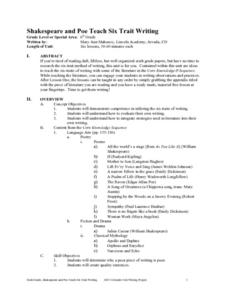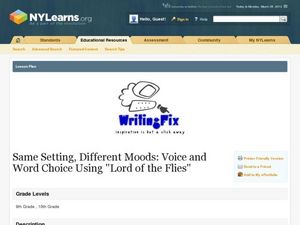Curated OER
Borrowing Narrative Skills from Mr. Fletcher: Using a "Prompts in Reverse" Technique to Inspire Your Writers
Help your class find their writing voices with this activity which uses the work of Ralph Fletcher to guide a "Prompt in Reverse" activity. Using the chapter "First Pen" from Fletcher's Marshfield Dreams, learners decipher what they...
Curated OER
Shakespeare and Poe Teach Six-Trait Writing
A Six-Trait Writing instructional activity helps your middle schoolers liven up their word choice and shows them how to evaluate their own writing. Class members take a close look at the language used in poems by Shakespeare, Kipling,...
Curated OER
"Take my Advice": Poems with a Voice
Discuss the meaning of the phrase tone of voice with the class. They respond to a variety of scenarios where a particular tone would be prevalent. They then read "Mother to Son" without knowing the title and answer some questions about...
National Endowment for the Humanities
Poems that Tell a Story: Narrative and Persona in the Poetry of Robert Frost
Dig in deeper with Robert Frost's, "Stopping by Woods on a Snowy Evening." Learners will read and discuss poems by Robert Frost and learn the meaning of terms such as narrative and personal. They journal, collaborate, and present poetry...
Curated OER
Passive Voice Exercises
What is the difference between the active voice and the passive voice? Focus on the latter with your middle schoolers to help them strengthen their writing. First, they identify which sentences are written in the passive. Then, they...
Curated OER
Analyzing Poetry
Use this poetry analysis worksheet to help your learners understand a poem of their or your choosing. This resource asks class members to summarize the poem and analyze it by looking at voice, word choice, imagery, and theme. The...
Curated OER
Is Perception Reality? Writing Paradoxes in Poetry
Explore the paradox of the universe - or, at least, of popular music - with this lesson. Using the songs "Inaudible Melodies" by Jack Johnson and "She" by Green Day, your class will complete a graphic organizer to help them understand...
Curated OER
Compare and Contrast Author's Voice
Follow the procedural details here to model for your class how to identify author's voice in two poems, "Since Hannah Moved Away" by Judith Viorst and Mirriam Chaikin's "I Hate Harry." Together, determine voice and the words that reveal...
Curated OER
Your Voice
A wonderful presentation focuses on the use of one's voice. Many interesting tips show your pupils how to use their voices in certain social situations, and four activities allow everyone to take part. The presentation can facilitate...
Curated OER
Same Setting, Different Moods: Voice and Word Choice Using Lord of the Flies
Whether it's dark, delightful, or somber, set the mood with William Golding's Lord of the Flies. High-schoolers practice descriptive writing by creating the appropriate mood for an original scene, starring one of the book's main characters.
Curated OER
With Your Own Two Hands: Are You Changing the World or "Waiting for the World to Change"?
Can your pupils change the world? Explore this question with Ben Harper's song "With My Own Two Hands" and John Mayer's "Waiting for the World to Change." After listening to the songs, they discuss the tools at their disposal for...
Curated OER
"Voicing" - A Believable Account with "The Glory Fields" by Walter Dean Myers
Dr. Seuss and Walter Dean Myers team up to cover the topic of prejudice. Using The Sneeches (about the culture clash between star-bellied and bare-bellied Sneetches) and The Glory Fields (about a boy coming to America on a slave ship),...
Curated OER
A Poem for Two Voices for Dr. Jekyll and Mr. Hyde
Poems For Two Voices are a great resource in any language arts classroom, whether you are studying poetry or not. Focusing on The Strange Case of Dr. Jekyll and Mr. Hyde, this lesson prompts young authors to write a Poem For Two Voices...
Curated OER
A Call for Change
"Come gather round people, wherever you roam..." Bring the voice of Bob Dylan to your class with this lesson plan, which takes Dylan's song "The Times They Are A-Changing" and analyzes both the message and voice in the lyrics. Your class...
Curated OER
Developing Your Writing Voice
Developing a distinctive voice is a challenge all writers face. Here’s a presentation that defines the parts of voice (attitude, syntax, diction) and then asks viewers to engage in a series of activities designed to model how to develop...
Curated OER
Persuasive Essays
Follow this outline to write persuasive essays with your 11th grade college prep classes. Using the internet, they research a topic, citing their sources correctly. They work with a partner to peer edit their rough drafts, checking for...
Curated OER
Style and Voice
Develop the writing skills of your high school class. Writers consider their personal style and voice, read selections by other authors, and then write pieces that challenge them to experiment with their own style.
Curated OER
"Knot" the Whole Truth: Writing a Modern-Day Story with a Tall Tale's Voice
Beyond Paul Bunyan and his blue ox, tall tales can be a great way to teach young writers about word choice and voice in their writing. Using Jerry Spinelli's Maniac Magee and the Six-Trait Writing process, they begin to write their own...
Curated OER
Tenses and Conjugation
Present, past, future, present perfect, past perfect, and future perfect. Past, active, indicative. Need a worksheet that not only defines verb forms, but demonstrates how to use them? If you want a resource for class members needing...
Curated OER
Voice Lessons
Young scholars visualize examples of sentence structure by creating patterns with Lego blocks. They apply terms of voice and syntax by critiquing others' writings as well as revising their own writing pieces. Revision is the key within...
Curated OER
Faulkner's The Sound and the Fury: Narration, Voice, and the Compson Family's New System
Learners complete a variety of discussion and writing activities surrounding the study of Faulkner's The Sound and the Fury.
Curated OER
Voice and James Joyce
After reading a text written by James Joyce, middle and high schoolers find examples of passive voice. They share their findings with the class. Use this lesson to emphasize the effect of passive voice in writing.
Curated OER
Changing the Point of View
Fourth graders identify the point of view. In this point of view lesson students compare and contrast the point of view from third person omniscient and first person. Students rewrite a paragraph in an alternative point of view.
Curated OER
In Our Own Voice
Young scholars, after being introduced to poetry in the language arts class, prepare to produce a product by identifying and writing a variety of different types of poetry. They utilize digital cameras, camcorders, computers and the...

























